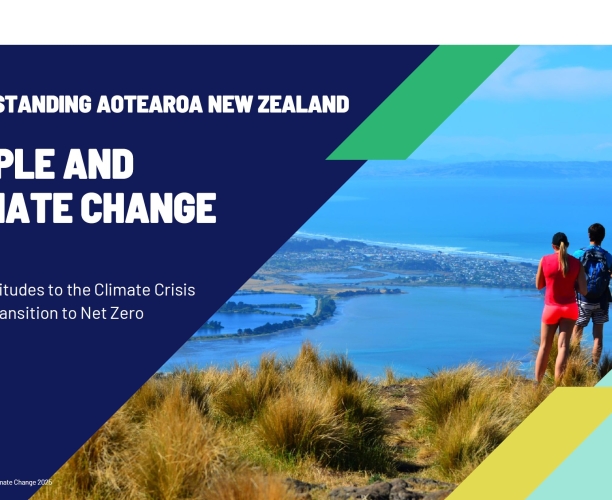

Ipsos Aotearoa New Zealand - People and Climate Change Report 2025
New Zealanders’ concern over impact of climate change and perceived importance of climate action declining
New Zealand / Aotearoa, 17 April 2025 - Ipsos New Zealand has released the findings of a new 32-country study for Earth Day, perceptions of the risks facing us from the climate crisis as well as where is the responsibility for greater action.
Key findings from the Ipsos People and Climate Change Report include:
- The proportion of New Zealanders who think that our country should be doing more to tackle climate change has decreased significantly, to 54% in 2025 from 64% in both 2024 and 2023. Notably, this is also significantly lower than the 32-country average of 62%.
- New Zealanders’ concern about the impact of climate change on our own country has declined to 69% from 76% in 2022 and 80% in 2023 (likely driven by Cyclone Gabrielle and the Auckland Anniversary Weekend floods). This is in contrast to what is happening globally, where concern about the local impact of climate change is on the rise.
- Despite the majority recognising that a 1.5˚c rise in average global temperature is a big deal (58% New Zealand, 53% 32-country average), the perceived importance of climate action is decreasing in both New Zealand and around the world. Fewer New Zealanders now believe that individuals need to act now to combat climate change (62%, down from 73% in 2022). Fewer also believe that businesses need to take action (57%, down from 70% in 2022).
- Fewer than 1 in 4 (23%) New Zealanders think that the government has a clear plan in place to tackle climate change. This is a significant drop from 32% in 2024 (and 46% in 2022) and places New Zealand in the bottom seven among the 32 countries surveyed.
- However, the majority (62%) of New Zealanders still think that government needs to act now to combat climate change.
- On the topic of transitioning to renewable energy, 62% of New Zealanders believe that renewable energy will have a positive impact on air quality (significantly higher than the 32-country average of 54%), while around half recognise the positive impact it will have on animals (50%) and public health (44%).
- However, misperceptions and concerns persist: 41% of New Zealanders think that electric cars are as bad as petrol cars for the planet. 45% also believe that transitioning to renewable energy will lead to higher energy prices, while 25% think it will lead to less reliable energy supply.
Carin Hercock, Country Manager, Ipsos New Zealand, said: “This year we have seen a significant shift in New Zealanders’ views on climate change. As we move further away from the significant weather events of 2023, concern about the impact of climate change on New Zealand has dropped, as have beliefs that we should be doing more to tackle the issue. Other countries are showing a different trend, where concern for local impact has increased, such as in the US following the recent fires.”
Amanda Dudding, Executive Director Public Affairs, Ipsos New Zealand, added: “The shift towards using more renewable energy is seen to provide positive benefits such as for air quality, public health and animals. However, there are some areas of concern for New Zealanders, particularly around whether it will lead to higher energy prices. In addition, two in five think that electric cars are as bad for the environment as petrol ones.”
*The “32-country average” reflects the average result for all the countries and markets where the survey was conducted. It has not been adjusted to the population size of each country or market and is not intended to suggest a total result.
Technical note: Ipsos interviewed 23,745 people online between January 24, 2025 and February 7, 2025 in 32 countries. Quotas were set to ensure representativeness and data have been weighted to the known population profile of each country. The sample consists of approximately 1,000 individuals each in Australia, Brazil, Canada, France, Germany, Great Britain, Italy, Japan, New Zealand, the Philippines, Spain, and the U.S., and 500 individuals each in Argentina, Belgium, Chile, Colombia, Hungary, Indonesia, Ireland, Malaysia, Mexico, the Netherlands, Peru, Poland, Singapore, South Africa, South Korea, Sweden, Switzerland, Thailand, and Türkiye. The sample in India consists of approximately 2,200 individuals, of whom approximately 1,800 were interviewed face-to-face and 400 were interviewed online.



